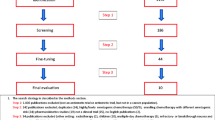Abstract
The rates of delayed nausea and vomiting by moderately emetogenic chemotherapy in patients with previous experience of acute emesis are usually quite high. This is a pilot study aiming to evaluate the safety of a new antiemetic schedule to prevent delayed emesis in this subset of patients.
During 5 consecutive cycles of moderately emetogenic chemotherapy, we evaluated 50 patients (15 males) who experienced acute emesis in the first cycle of treatment. The regimen for prevention of delayed emesis consisted of daily tropisetron (5 mg orally from d 2 to d 6 of each chemotherapeutic cycle) associated to ACTH-Depot (1 mg intramuscularly 24 and 68 h after the initiation of chemotherapy).
In 77% of chemotherapy cycles, there was a total elimination of nausea and vomiting, whereas in the remaining 23% of cycles, there was a major response defined as ≤ 2 vomiting episodes per cycle or nausea grade 1 according to the WHO. The efficacy of the antiemetic regimen persisted during the entire treatment program without the appearance of toxic effects.
The proposed antiemetic regimen is highly active in preventing delayed nausea and vomiting episodes in patients receiving moderately emetogenic chemotherapy. Moreover, no toxic effects were observed. These promising results require confirmation by a randomized trial.
Similar content being viewed by others
References
Kris, M.G., Roila, F., De Mulder, P.H., et al. (1998). Delayed emesis following anticancer chemotherapy. Support Care Cancer 6(3):228–232.
Ballatori, E., Roila, F., De Angelis, V., et al. (1997). Clinical and methodological issues in antiemetic therapy: a worldwide survey of experts’ opinions. Multinational Association of Supportive Care in Cancer. Support Care Cancer 5(4):269–273.
The Italian Group for Antiemetic Research. (1997). Delayed emesis induced by moderately emetogenic chemotherapy: do we need to treat all patients? Ann. Oncol. 8(6):561–567.
Yalcin, S., Tekuzman, G., Baltali, E., et al. (1999). Serotonin receptor antagonists in prophylaxis of acute and delayed emesis induced by moderately emetogenic, single-day chemotherapy: a randomized study. Am. J. Clin. Oncol. 22(1):94–96.
Roila, F., and Del Favero, A. (1997). Antiemetics revisited. Curr. Opin. Oncol. 9(4):321–326.
Campora, E., Giudici, S., Merlini, I., et al. (1994). Ondansetron and dexamethasone versus standard combination antiemetic therapy: a randomized trial for the prevention of acute and delayed emesis induced by cyclophosphamide-doxorubicin chemotherapy and maintenance at subsequent courses. Am. J. Clin. Oncol.: Cancer Clin. Trials 17(6):522–526.
Pater, J.L., Lofters, W.S., Zee, B., et al. (1997). The role of the 5-HT3 antagonists ondansetron and dolasetron in the control of delayed onset nausea and vomiting in the patients receiving moderately emetogenic chemotherapy. Ann. Oncol. 8(2):181–185.
Lofters, W.S., Pater, J.L., Zee, B., et al. (1997). Phase III double-blind comparison of dolasetron mesylate and ondansetron and an evaluation of the additive role of dexamethasone in the prevention of acute and delayed nausea and vomiting due to moderately emetogenic chemotherapy. J. Clin. Oncol. 15(8):2966–2973.
Ioannidis, J.P., Hesketh, P.J., and Lau, J. (2000). Contribution of dexamethasone to control of chemotherapy-induced nausea and vomiting: a meta-analysis of randomized evidence. J. Clin. Oncol. 18(19):3409–3422.
Perez, E.A. (1999). 5-HT3 antiemetic therapy for patients with breast cancer. Breast Cancer Res. Treat. 57(2):207–214.
Antiemetic Subcommission of the Multinational Association of Supportive Care in Cancer (MASCC). (1998). Prevention of chemotherapy- and radiotherapy-induced emesis: results of Perugia Consensus Conference. Ann. Oncol. 9(8):811–819.
Gregory, R.E. and Ettinger, D.S. (1998). 5-HT3 receptor antagonists for the prevention of chemotherapy-induced nausea and vomiting. A comparison of their pharmacology and clinical efficacy. Drugs 55(2):173–189.
Kaizer, L., Warr, D., Hoskins, P., et al. (1994). Effect of schedule and maintenance on the antiemetic efficacy of ondansetron combined with dexamethasone in acute and delayed nausea and emesis in patients receiving moderately emetogenic chemotherapy: a phase III trial by the National Cancer Institute of Canada Clinical Trials Group. J. Clin. Oncol. 12(5):1050–1057.
Koo, W.H. and Ang, P.T. (1996). Role of maintenance oral dexamethasone in prophylaxis of delayed emesis caused by moderately emetogenic chemotherapy. Ann. Oncol. 7(1):71–74.
The Italian Group for Antiemetic Research. (1995). Dexamethasone, granisetron, or both for the prevention of nausea and vomiting during chemotherapy for cancer. N. Engl. J. Med. 332(1):1–5.
The Italian Group for Antiemetic Research. (2000). Dexamethasone alone or in combination with ondansetron for the prevention of delayed nausea and vomiting induced by chemotherapy. N. Engl. J. Med. 342(21):1554–1559.
Colbert, N., Izrael, V., Lotz, J.P., et al. (1983). Adrenocorticotropic hormone in the prevention of cisplatininduced nausea and vomiting. J. Clin. Oncol. 1(10):635–639.
Passalacqua, R., Cocconi, G., Bella, M., et al. (1992). Double-blind, randomized trial for the control of delayed emesis in patients receiving cisplatin: Comparison of placebo vs adrenocorticotropic hormone (ACTH). Ann. Oncol. 3(6):481–485.
Passalacqua, R., Cocconi, G., Caminiti, C., et al. (1997). Double-blind, multicenter, randomized trial to compare the effect of two doses of adrenocorticotropic hormone versus placebo in controlling delayed emesis after high-dose cis-platin in adult patients with cancer. J. Clin. Oncol. 15(6):2467–2473.
Dunn, A.J. and Gipsen, W.H. (1997). How ACTH acts on the brain. Biobehav. Rev. 1:15–23.
Karim, F., Roerig, S.C. and Saphier, D. (1996). Role of 5-hydroxytryptamine3 (5-HT3) antagonists in the prevention of emesis caused by anticancer therapy. Biochem. Pharmacol. 52(5):685–685.
Author information
Authors and Affiliations
Corresponding author
Rights and permissions
About this article
Cite this article
Santini, D., Vincenzi, B., Fossati, C. et al. Prevention of delayed emesis induced by moderately emetogenic chemotherapy in patients with acute emesis. Med Oncol 18, 131–135 (2001). https://doi.org/10.1385/MO:18:2:131
Received:
Accepted:
Issue Date:
DOI: https://doi.org/10.1385/MO:18:2:131




